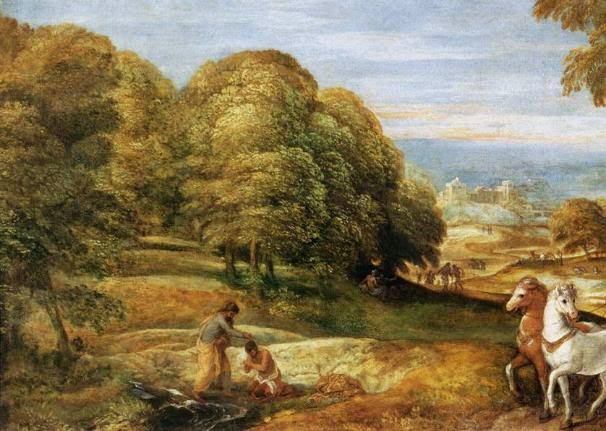I’ve been reading Alan J. Thompson’s latest volume in the NSBT series titled The Acts of the Risen Lord Jesus (my review of it here). In chapter 3, Israel and the Gentiles: the kingdom and God’s promises of restoration, he points out that Acts 1.6-8 says a lot about how the book of Acts will play out. Throughout his book Thompson shows how the kingdom of God is seen throughout Acts, how Acts continues the themes from Luke’s Gospel, and how Acts tells us that God keeps his covenant promises.
In Acts 1.6 the disciples ask Jesus, “Lord, will you at this time restore the kingdom to Israel?” Jesus answers them in verses 7-8, and many people find his answer to be an odd one. Though I can’t get into it now, Thompson believes and gives evidence for the position that the disciples did understand what Jesus meant by the Kingdom of God (Acts 1.3). The disciples ask about the kingdom of God and Israel in 1.6, and he answers them in 1.7-8.
In 1.8 Jesus gives three phrases which reflect the OT:
- ‘when the Holy Spirit comes upon you’ (Isa 32.15)
- This refers to the “end of the desolation of Judah and the coming of the new age with the pouring out of the Holy Spirit” (107)
- ‘you will be my witnesses’ (Isa 43.12)
- God’s people will be transformed, now that he is the only God and Savior, and will be his witnesses to an unbelieving world around them.
- ‘to the ends of the earth’ (Isa 49.6)
- A Servant representing Israel will restore Israel, and this restoration will include Gentiles (Isa 49.6 is also used in Acts 13.47, where Paul and Barnabas explain their reasoning for reaching out to Gentiles).
God will rebuild the Davidic Kingdom “through the ascension of the Lord Jesus Christ to the throne of David (2:30-33), the pouring out of the promised Holy Spirit of the last days (2:16-17), the ingathering of the exiles of Israel (2:5, 9-11) and the repentance and turning to the Lord of Israel in Jerusalem, Judea and Samaria, which unite under one Davidic King (2:38-47; 4:4; 8:4-25)” (116).
Outcasts
In Acts 8.26-40, Philip comes across an “Ethiopian,” a “eunuch,” a “court official,” although after 8.27 the man is only referred to as a eunuch. Why a eunuch of all titles? Thompson shows that Luke says four things about this eunuch:
- v34, ’the eunuch’ asks Philip about a passage of Scripture (Isa 53.7-8)
- v36, ‘the eunuch’ asks about baptism
- v38, ‘the eunuch’ is baptized by Philip
- v39, ‘the eunuch’ did not see the vanished Philip again “but went on his way rejoicing” (116).
Luke emphasizes the fulfillment of Isaiah throughout Acts (Acts 1.8; 8.34 quoting Isa 53.7-8; Acts 13.47; and in many more places). While the eunuch is reading Isaiah 53, it is in Isaiah 56 where we see God’s promises for the eunuch. “Isaiah 56 looks forward to the time of God’s salvation when the exclusion of those with defects from the assembly of God’s people in [Deut] 32:1-7 will be overturned“ (117).
Isa 56.3 says, “Let not the foreigner who has joined himself to the Lord say, “The Lord will surely separate me from his people”; and let not the eunuch say, ‘Behold, I am a dry tree.’”
In 56.5 the Lord tells the eunuchs, “I will give in my house and within my walls a monument and a name better than sons and daughters; I will give them an everlasting name that shall not be cut off.”
The Lord will give joy to those who love and worship him (56.7-8). 56.8 ties the gathering together of Israel with the gathering together of foreigners, including eunuchs. Here in Acts 8, the “despised and rejected” eunuch is reading about the “humiliation and ministry of this despised and rejected Servant” (117).
“All the promises of God are ‘Yes’ in Christ” (2 Cor 1.20). All of God’s promises are fulfilled in Christ. Israel looked forward to the physical resurrection, and it happened in Christ Through Christ’s resurrection Israel was and is being gathered together with Gentiles included, as the one people of God. Christ “has broken down in his flesh the dividing wall of hostility… that he might create in himself one new man in place of the two” (Eph 2.14-15). Christ, seated at the right hand of God, rules and reigns now, and we are to be his witnesses to the ends of the earth.



Thanks for sharing, Spencer! Knowing the OT background for Acts 1:6-8 adds a lot of perspective to it, which I was unaware of before. It’s wonderful how you can always go deeper and deeper into the Scriptures – and yet feel like you have just begun to scratch the surface.
LikeLike
Hey, Jan. It surprises me how deep and interconnected it all is. Thompson’s written an incredible book, but even after you finish it, you only want more.
LikeLike
Reblogged this on Talmidimblogging.
LikeLike